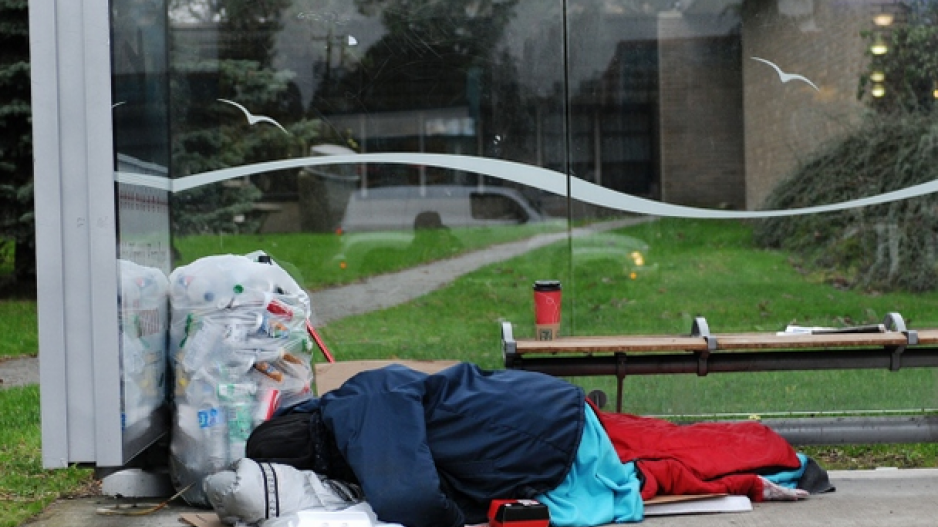By Mike Howell, Vancouver Courier. Image: Homelessness is still a major problem in Vancouver, but talk about real estate continues to dominate conversations | Photo: Dan Toulgoet
Happy New Year!
Now all of you get back to work, school or whatever it is you do…
I hesitate to begin 2016 with a bummer of a rant, but tell me if you haven’t reached the same conclusion I did on my drive into the office January 5: For far too long, we’ve had the same tiresome conversation about real estate and how much it costs to live in Vancouver and its suburbs.
It hit me as I listened to Burnaby city councillor Nick Volkow talk to CBC radio host Rick Cluff. They were discussing the property assessments homeowners have either received or will receive this week.
Yep, Volkow’s went up and he’s not happy about it because it means a spike in his taxes and possibly losing his homeowner’s grant. It’s a financial hit that many will face.
But here we go again, I thought, complaining about real estate prices, how the cost of housing is unaffordable and that senior levels of government haven’t done anything to address it.
So tiresome, so Vancouver.
For renters listening in, they must have had a good laugh, maybe turned the dial to a rock ‘n’ roll station or punted their radio into the next room. That’s, of course, if they had another room to punt it to.
We’ve increasingly become a city of extremes, and I see no substantial evidence to suggest that definition will change by the end of this year, or the next.
The guy sacked out that morning in a sleeping bag outside the Starbucks at the Main Street SkyTrain station is proof. So is the fact Lululemon founder Chip Wilson’s waterfront mansion was assessed at $63.8 million.
We live in a free market, we don’t have rent controls and we have a relatively safe, warm, geographically beautiful city that continues to be desirable for winter-fatigued Canadians and investors.
I get that Vancouver has always had the rich and the poor. And I know that gap has widened. It’s also true the more people I talk to, the more I hear them say they’re tired of surviving in this city and just want to live in it.
A holiday sit-down with relatives who grew up around Main and 25th turned into a discussion about high rents, expensive homes and how Vancouver just ain’t like it used to be.
Some people call it progress, some call it change.
The transformation of Vancouver has apparently been good for the economy. The Conference Board of Canada forecasts that Vancouver and its region will lead the nation in economic growth from 2016 to 2019.
Some good news, perhaps.
But ask the average Vancouverite or suburbanite whether all this progress, all this change — while wages and salaries remain stagnant and commute times increase — has put them in a better place than they were a decade ago.
My limited research suggests you’ll get an earful.
So until the real estate market collapses or governments make some magical changes on the housing front, we’ll be left with more tiresome talk about property values and overpriced fixer-uppers.
We’ll also be left with politicians pointing fingers at each other over what to do about a city that is no longer affordable for many people who grew up here or want to live here.
It’s 2016, people.
Vancouver is what it is — a big, expensive city.
Deal with it or move out.
At least change the topic.
Note: About an hour after filing this uplifting piece, Mayor Gregor Robertson's office sent out a statement regarding Vancouver's housing market. Here's what I was referring to a few sentences ago:
"The average price of a detached home sold within the City of Vancouver has surpassed $2.5 million, but runaway price growth in recent years has also been seen across all forms of housing and in municipalities throughout Metro Vancouver. Far too many families on modest incomes cannot afford to live in our city or even in this region, which has enormous consequences for Vancouver's economy and quality of life."
Here's the part where he dumps on senior levels of government:
"At Vancouver city hall, we're continuing to use every available resource to get new affordable housing built for those who need it most, but this week's B.C. Assessment numbers only underscore the urgency of a combination of reasonable and responsible actions that must be taken by the B.C. and federal governments."
Vancouver, the mayor concluded, must remain a city that people of all ages, backgrounds and income levels can afford to call home.
Good luck, everyone.
@Howellings
For more from the Vancouver Courier, visit www.vancourier.com.




